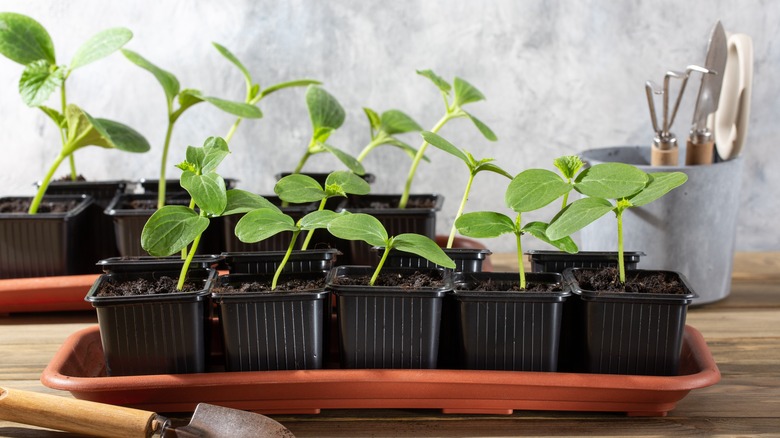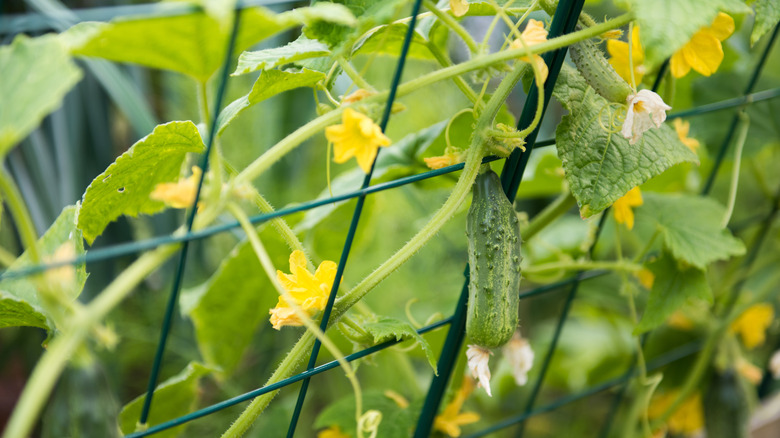The TikTok Gardening Community Has Helpful Tips To Start Growing Cucumbers
Cucumbers usually top the list for great vegetables to grow in your garden, especially as a beginner. Once you learn their preferences, they are rather low maintenance and will provide bountiful fruits for your labors all season so long as they are cared for properly. Fortunately for us, TikTok garden account @mindandsoil offers a number of helpful tips to get your cucumbers off to a great start this season. First and foremost, he recommends starting your cucumber seeds inside. This is a great choice because it allows you to extend the growing season by starting seeds before the last frost, ensuring a more abundant harvest. Moreover, cucumber plants are most vulnerable in the early stages, and starting them inside allows you to control the environmental conditions.
Another helpful tip that @mindandsoil recommends is using 3-inch seed cells with a nutrient-rich seedling mix, such as worm castings. Using a quality seedling mix is essential for helping your seeds start off healthily so that they can thrive later in your garden. The 3-inch cells provide the perfect amount of room for the seeds to develop roots in a manageable amount of space. When packing your cells, sow about five seeds per cell, which increases the likelihood of successful germination as not all of the seeds are likely to sprout. Once the seedlings emerge, you'll have more choice in choosing the strongest ones to transplant into your garden, thinning the weaker ones that are less likely to survive.
Transplanting your cucumbers
Once your little green beauties have started to emerge from their soil slumber, it's time to start preparing the garden for their summer home. @mindandsoil recommends mixing 75% compost with 25% vermiculite for their growing medium. You can add this mixture to your raised garden beds or the top layer of your garden for a fresh start for your cucumber plants. The compost will enrich your soil with essential nutrients, a crucial step because cucumbers are heavy feeders. The vermiculite, specifically, helps to improve the soil structure, aeration, and water retention — another important must as cucumbers are also heavy drinkers.
You can safely begin to harden off your cucumber seedlings once the outdoor temperature hovers around 50 degrees Fahrenheit at night. Moving cucumbers outside too soon may put them at risk of frost damage as they are highly sensitive to cold temperatures. Waiting until the weather is reliably warm will protect your plants in the long run.
A final recommendation from @mindandsoil is to use an A-frame trellis to support the plants as they grow vertically. This will help to promote more space in your garden as well as establish better air circulation, which can reduce the risk of disease and pest infestations. When transplanting your seedlings, you can also toss in a handful of fresh worm castings and a superfood fertilizer to give the baby plants a nice boost as their roots establish themselves in their new environment.
Caring for your cucumbers after transplanting
Once your cucumber seedlings have touched down in your garden outdoors, the real fun begins! @mindandsoil has some final tips to ensure that you have a great harvest all summer long. One of the most important steps to practice with cucumbers — like with many gourds and nightshades — is to pinch off all the early flowers that emerge once your plant gets going. While it may break your heart to do so, pinching off the flowers forces your cucumber plant to direct energy into developing strong roots and expansive foliage instead. Strong roots provide a great base for your cucumber plants to absorb nutrients, while bigger leaves allow for more photosynthesis to occur. As a result, you'll have many healthy fruits to harvest.
Another important care practice is to water cucumbers deeply and often. They are more than 90% water and require intense moisture to flourish in your garden. Be sure the soil is always moist but not waterlogged. Finally, once your plant has healthy fruits beginning to emerge, it's important to harvest cucumbers early and often. The more you harvest your cucumbers, the more flowers they will produce, leading to more fruit throughout the season. Cucumbers are generally ripe when deep green, firm, and crisp. Leaving them on the plant too long will cause them to taste bitter. Ultimately, as long as you provide your cukes with water and room to grow, they won't stop until the fall when temperatures plunge.

